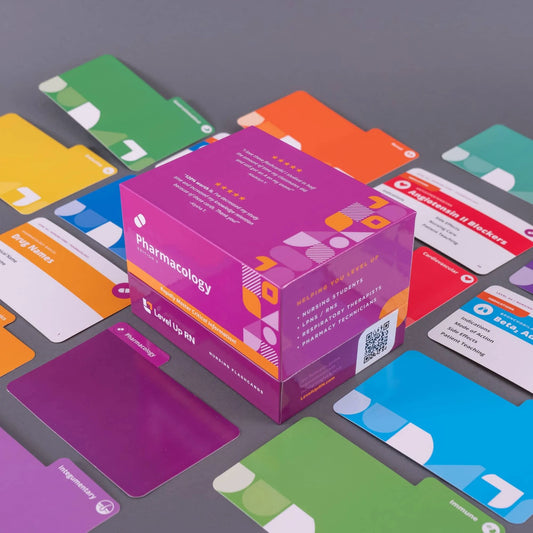Pharmacology - Nursing Flashcards
This article wraps up our coverage of gastrointestinal medications, including IBS medications, gastrointestinal anti-inflammatory medications, and pancreatic enzymes.
The Nursing Pharmacology video series follows along with our Pharmacology Flashcards, which are intended to help RN and PN nursing students study for nursing school exams, including the ATI, HESI, and NCLEX.
 When you see this Cool Chicken, that indicates one of Cathy's silly mnemonics to help you remember. The Cool Chicken hints in these articles are just a taste of what's available across our Level Up RN Flashcards for nursing students!
When you see this Cool Chicken, that indicates one of Cathy's silly mnemonics to help you remember. The Cool Chicken hints in these articles are just a taste of what's available across our Level Up RN Flashcards for nursing students!
IBS (irritable bowel syndrome)
IBS, or irritable bowel syndrome, is an intestinal disorder that can cause diarrhea or constipation or sometimes a combination of both.
IBS medications
IBS medications include alosetron and lubiprostone.
Alosetron (Lotronex)
 Alosetron is for “loose” stools. Lubiprostone is for stone-like poop.
Alosetron is for “loose” stools. Lubiprostone is for stone-like poop.
Alosetron mode of action
Alosetron is used for IBS with diarrhea. It works by blocking 5HT3 receptors, which increases the firmness of the stool and decreases the sense of urgency to defecate.
Alosetron side effects
The key side effect of alosetron is constipation. This medication has a black-box warning due to the complications of constipation as well as the risk for ischemic colitis, a temporary reduction in blood flow to part of the large intestine (colon).
Lubiprostone (Amitiza)
Lubiprostone is an IBS medication used for IBS with constipation.
Lubiprostone mode of action
Lubiprostone works by increasing fluid secretion in the intestine and increasing intestinal motility.
Lubiprostone side effects
Side effects of lubiprostone can include diarrhea, nausea, and headache.
GI anti-inflammatory: sulfasalazine (Azulfidine)
Sulfasalazine is a GI anti-inflammatory medication that can be used to treat irritable bowel syndrome and other irritable bowel diseases, such as Crohn's disease (a chronic inflammatory bowel disease that affects the lining of the digestive tract) and ulcerative colitis (a chronic inflammatory bowel disease that causes inflammation in the digestive tract).
Sulfasalazine mode of action
Sulfasalazine works by inhibiting prostaglandin synthesis, which helps to decrease inflammation in the colon.
Sulfasalazine side effects
Side effects of sulfasalazine can include blood dyscrasias, such as anemia and agranulocytosis (a decrease in the number of granulocytes, a type of white blood cell).
Other side effects can include GI upset, rash, headache, crystalluria (cloudy urine caused by crystals found in the urine), and fever.
Sulfasalazine nursing care
It is important to teach a patient on sulfasalazine that this medication may cause orange-yellow discoloration of their urine and/or skin. It's also important to monitor the patient's CBC levels during therapy due to the risk of blood dyscrasias.
Antiflatulent: simethicone (Gas-X)
 Now that you ate an ice cream cone, you sure are gassy! Better go take some simethicone.
Now that you ate an ice cream cone, you sure are gassy! Better go take some simethicone.
Simethicone is a medication that can offer relief from painful gas in the GI tract.
Simethicone mode of action
Simethicone causes the coalescence (merging) of gas bubbles. The medication works by reducing the surface tension of gas bubbles, allowing them to be expelled via flatulence or belching.
Simethicone side effects
Simethicone has no significant side effects.
Simethicone administration
Administer simethicone after meals and at bedtime.
Pancreatic enzymes for digestion: pancrelipase (Pancrease)
 Pancrelipase helps break down food when your pancreas isn’t getting the job done.
Pancrelipase helps break down food when your pancreas isn’t getting the job done.
The pancreas plays an important role in digestion, bringing digestive enzymes into the intestine. If the pancreas isn't working properly, then the intestines are not getting those digestive enzymes.
Pancrelipase mode of action
Pancrelipase is a pancreatic enzyme that can be administered when a patient has pancreatic insufficiency due to a disorder such as cystic fibrosis or pancreatitis, or if they've had GI bypass surgery. It contains lipase (a protein that helps the body absorb fats), amylase (an enzyme that catalyzes the hydrolysis of starch into sugars), and protease (an enzyme that helps break down protein in food into amino acids), which facilitate the digestion of fat, carbohydrates, and proteins in the GI tract.
Pancrelipase side effects
The side effects of this medication can include diarrhea, nausea, and abdominal pain.
Pancrelipase administration
Patients should be instructed to take pancrelipase immediately before or with their meals and snacks to allow for digestion. Also, it is important to advise patients to swallow the pills whole — they should not crush them. If they have difficulty swallowing the pills, open up the capsules and sprinkle the medication on applesauce, to make it easier (and tastier) to administer.


